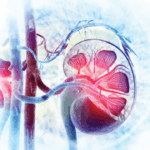
From gas and bloating after a heavy meal to heartburn causing a poor night’s sleep, tummy troubles are no stranger to many.
The digestive system helps us break down food, absorb nutrients, and eliminate waste products. Beyond these essential functions, this vital system is also inhabited by our gut microbiota and supports inflammatory processes. Researchers continue to unravel the importance of our gut health, and how it is linked to conditions such as diabetes, obesity, depression, and anxiety. Before you reach for the next over-the-counter antacid, let’s explore why digestive problems occur and how you can get back on track to enjoying the foods you love.
Why is your tummy in trouble?
Heartburn, gas, bloating, constipation… these symptoms don’t happen unless there is a reason. Your age, stress level, sleep quality, and various other causes can lead to poor digestion. Here are a few important triggers of tummy troubles.
UNHEALTHY FOOD CHOICES. It’s not surprising that your food choices and eating habits shape your digestion. Regular consumption of highly processed foods and food additives, along with low fiber intake, can negatively impact the gut microbiota, leading to inflammation. Eating foods you may be sensitive to, such as gluten and dairy, eating too fast, and consuming heavy meals are practices known to trigger gas, bloating, and heartburn.
IT’S LOW STOMACH ACID, NOT HIGH. Contrary to popular belief, symptoms of heartburn are often associated with low, not high, hydrochloric acid (HCl) in our stomachs. Stomach acid is needed to break down proteins, kill harmful pathogens, and properly absorb nutrients such as vitamin B12, calcium, and zinc. However, stress, aging, and long-term use of antacids and proton-pump inhibitors (PPIs) can create a situation of hypochlorhydria (low stomach acid), negatively impacting these actions.
Although short-term use of PPIs may be helpful for some individuals, research has shown that long-term use is not only associated with hypochlorhydria, but also with increased fracture risk, dementia, myocardial infarction, and death. The betaine HCl challenge is a test that helps determine your stomach acid status. Speak to your naturopathic doctor to determine if this test is suitable for you. Imbalanced gut bacteria. The gastrointestinal tract is home to several microorganisms, including good bacteria, establishing the gut microbiota. The microbiota is key to strengthening the gut barrier, protecting us against different pathogens, and regulating immunity. Any imbalance in the community of the gut’s microbes, often triggered by what we eat, toxin exposure, and stress, can lead to dysbiosis. In turn, dysbiosis can result in increased inflammation and leaky gut, linked to intestinal conditions such as irritable bowel syndrome (IBS) and gastroesophageal reflux disease (GERD), allergies, asthma, and obesity.
Healing your tummy troubles with the 4 Rs
Whether you suffer from occasional stomach upset or full-blown discomfort after every meal, here are four key steps you can follow to start healing your gut.
Step 1: Remove
Your digestive system will begin its road to recovery if you remove harmful triggers such as stress, food sensitivities, high-FODMAP foods, and pathogens like yeast and parasites. Eating plans such as the Mediterranean diet and the low-FODMAP diet have been shown to support our good bacteria, reduce gas and bloating symptoms, and regulate bowel movements. Enjoy a variety of gut-healing foods such as plant-based proteins, fruits and vegetables, omega-3 fatty acids, and bone broth.
Step 2: Replace
Low levels of stomach acid and digestive enzymes need to be replaced to aid digestion, promote absorption, and prevent digestive upset. Stomach acid levels can be supported with betaine hydrochloride supplements and/or the use of bitter herbs such as gentian. Furthermore, using supplemental digestive enzymes can help with the breakdown of carbohydrates, proteins, and fats. This is also a good time to ensure any nutrient deficiencies – typically low levels of vitamin B12, folic acid, and iron – are corrected with the use of high-quality foods and/or supplements.
Step 3: Reinoculate
To overcome concerns of dysbiosis, it’s essential to reinoculate the gut with good bacteria. Prebiotics, fermented foods, and probiotics can help support the microbiota. Prebiotics, naturally found in many plant foods, including fruits, vegetables, and grains, can stimulate the growth and activity of our good bacteria. In contrast, fermented foods and probiotic supplements provide live microorganisms that promote gastrointestinal balance. Using probiotics during dysbiosis can help stimulate the growth of beneficial gut microbes and improve overall digestive symptoms.
Step 4: Repair
An unhealthy gut lining can develop small holes and tears that can become larger over time, known as leaky gut. Under such circumstances, partially digested foods, bacteria, and harmful toxins can pass into the bloodstream, traveling throughout the body where they cause inflammation and other health concerns. The gut lining can be repaired with nutrients such as L-glutamine and curcumin. Of course, following the suggestions outlined in steps 1–3 can also promote a healthy gut lining for proper food breakdown and absorption through the digestive tract.
Resolving your tummy troubles can help you get back to living the life you enjoy. Taking small steps is the best way to tackle digestive concerns and say goodbye to tummy troubles.
References
- Aoun A, Darwish F, Hamod N. The influence of the gut microbiome on obesity in adults and the role of probiotics, prebiotics, and synbiotics for weight loss. Prev Nutr Food Sci. 2020; 25(2):113-23.
- Aw W, Fukuda S. Understanding the role of the gut ecosystem in diabetes mellitus. J Diabetes Investig. 2018; 9(1):5-12.
- Clapp M, Aurora N, Herrera L, et al. Gut microbiota’s effect on mental health: The gut-brain axis. Clin Pract. 2017; 7(4):987.
- Shi Z. Gut microbiota: An important link between Western diet and chronic diseases. Nutrients. 2019; 11(10):2287.
- Kines K, Krupczak T. Nutritional interventions for gastroesophageal reflux, irritable bowel syndrome, and hypochlorhydria: A case report. Integr Med (Encinitas). 2016; 15(4):49-53.
- Ariel H, Cooke JP. Cardiovascular risk of proton pump inhibitors. Methodist Debakey Cardiovasc J. 2019; 15(3):214-9.
- Xie Y, Bowe B, Li T, et al. Risk of death among users of proton pump inhibitors: a longitudinal observational cohort study of United States veterans. BMJ Open. 2017; 7(6):e015735.
- Thursby E, Juge N. Introduction to the human gut microbiota. Biochem J. 2017; 474(11):1823-36.
- Carding S, Verbeke K, Vipond DT, et al. Dysbiosis of the gut microbiota in disease. Microb Ecol Health Dis. 2015; 26:26191.
- De Filippis F, Pellegrini N, Vannini L, et al. High-level adherence to a Mediterranean diet beneficially impacts the gut microbiota and associated metabolome. Gut. 2016; 65(11):1812-21.
- Staudacher HM, Whelan K. The low FODMAP diet: recent advances in understanding its mechanisms and efficacy in IBS. Gut. 2017; 66(8):1517-27.
- Cheng J, Ouwehand AC. Gastroesophageal reflux disease and probiotics: A systematic review. Nutrients. 2020; 12(1):132.
- Rao R, Samak G. Role of glutamine in protection of intestinal epithelial tight junctions. J Epithel Biol Pharmacol. 2012; 5(Suppl 1-M7):47-54.
- Wang J, Ghosh SS, Ghosh S. Curcumin improves intestinal barrier function: Modulation of intracellular signaling, and organization of tight junctions. Am J Physiol Cell Physiol. 2017; 312(4):C438-45.












